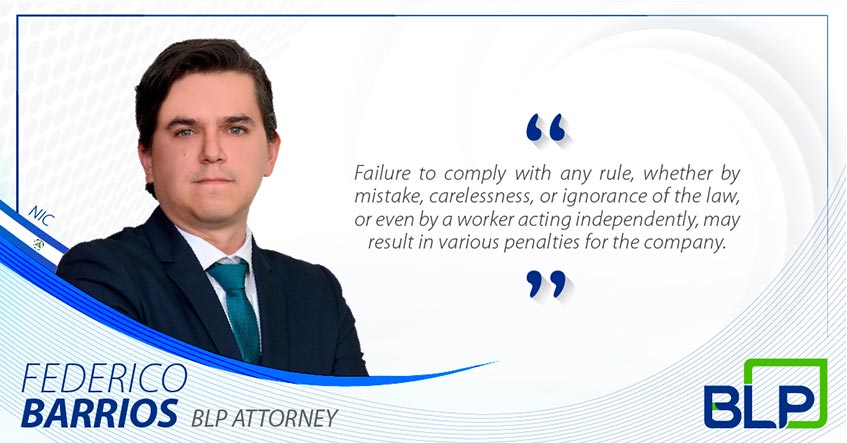In today’s market, a company can implement several types of Compliance programs and the application and scope of each vary according to the needs and requirements of the business.
In general, in Nicaragua, we are all obliged to comply with the law and all criminal, tax, civil, labor regulations, as well as the specific regulations of the sector in which our company operates, etc.
Some economic agents must also comply with the obligations imposed by the Law on Prevention of Money Laundering concerning identification and mitigation of the risk that the company will be used as a vehicle for operations with funds that come from or are intended to be part of an illegal activity.
Failure to comply with any rule, whether by mistake, carelessness, or ignorance of the law, or even by a worker acting independently, may result in various penalties for the company.
Therefore, it is recommended that companies have personalized systems that help their managers and shareholders to ensure compliance with their obligations and/or know which activities pose a greater risk. The basis for the compliance program to be effective and appropriate for each entity is the study and analysis of the risks faced by the company in its economic activity and business environment.
Risk analysis is the cornerstone for developing a compliance program.
In the international arena, Compliance and the industry that has been created around it, revolve around mitigating the risks that a company may have to be related or involved with Money Laundering or Terrorist Financing (Bank Secrecy Act), acts of corruption such as bribery and international bribery (FCPA, UK Bribery Act, Canadian FCPA), violation of economic sanctions (OFAC, EU, CANADA), and the fact that the governmental entities that apply each of these international programs see the Compliance programs as mitigating actors when deciding on the imposition of a fine for a violation.
At the national level, it is important to emphasize that Nicaraguan companies that are subsidiaries or have a close commercial relationship with companies in countries with strong anti-corruption, money laundering and/or economic sanctions programs should take special care to avoid getting involved in operations that may inadvertently lead them to violate the aforementioned regulations as they may carry fines for their business partners or parent companies.
By comparison, a commercial entity with an adequate compliance program should not only be classified as a company responsible and committed to national and international regulation but also one that provides a differentiating element and the added value of security during the negotiation of commercial agreements.
In summary, there are many reasons why it is important to know and manage the company’s legal risks. In some cases, the national authorities require such awareness for a company’s proper functioning within the established legal framework.
Any company that wishes to protect its operations and/or offer this added value to potential business partners should approach a professional in the field to:
1) Prepare a risk map of your company.
2) Develop a sectioned compliance program to cover the types of risks detected as the most important.
3) Follow up on the implementation of the compliance program in activities of continuous risk analysis, periodic training of personnel, and audit of the effective application of the program.



